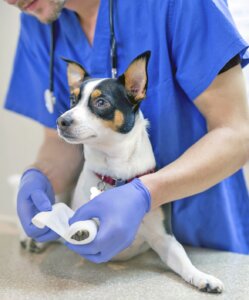Unveiling Canine Health: Exploring the 10 Most Common Diseases in Dogs

Dogs are not just pets; they’re beloved members of our families. As responsible pet owners, it’s crucial to be well-informed about the health issues that can affect our furry friends. In this comprehensive guide, we will delve into the 10 most common diseases that afflict dogs, shedding light on their causes, symptoms, and potential treatments.
- Canine Obesity
Obesity is a growing concern among dogs, just as it is in humans. The primary cause is an imbalance between caloric intake and expenditure. Poor diet choices and lack of exercise can lead to weight gain, putting dogs at risk for various health issues such as diabetes, arthritis, and heart disease.

Key Points:
- Causes: Overfeeding, lack of exercise, poor diet.
- Symptoms: Weight gain, lethargy, difficulty breathing.
- Prevention and Treatment: Balanced diet, regular exercise, portion control.
- Canine Dental Disease
Dental issues are often overlooked but can significantly impact a dog’s overall health. Poor oral hygiene can lead to periodontal disease, causing pain, discomfort, and even affecting vital organs.
Key Points:
- Causes: Lack of dental care, poor diet, genetic predisposition.
- Symptoms: Bad breath, swollen gums, difficulty eating.
- Prevention and Treatment: Regular brushing, dental treats, professional cleanings.
- Canine Osteoarthritis
Osteoarthritis, also known as degenerative joint disease, is a common ailment in aging dogs. It involves the gradual deterioration of joint cartilage, resulting in pain and stiffness.

Key Points:
- Causes: Aging, joint instability, genetic factors.
- Symptoms: Limping, difficulty rising, joint swelling.
- Prevention and Treatment: Weight management, joint supplements, physical therapy.
- Canine Ear Infections
Ear infections are prevalent, especially in dogs with floppy ears. Bacterial or yeast overgrowth can lead to discomfort and, if left untreated, may cause hearing loss.
Key Points:
- Causes: Moisture in ears, allergies, foreign bodies.
- Symptoms: Scratching at ears, head shaking, foul odor.
- Prevention and Treatment: Regular ear cleaning, monitoring for signs, prompt veterinary care.
- Canine Parvovirus (Parvo)

Parvovirus is a highly contagious viral disease that primarily affects puppies and unvaccinated dogs. It attacks the gastrointestinal tract, causing severe vomiting and diarrhea, which can be fatal if not treated promptly.
Key Points:
- Causes: Contact with infected feces, contaminated environment.
- Symptoms: Severe vomiting, bloody diarrhea, lethargy.
- Prevention and Treatment: Vaccination, proper hygiene, supportive care.
- Canine Heartworm Disease
Heartworm disease is a serious and potentially fatal condition caused by parasitic worms that invade the heart, lungs, and blood vessels of dogs. Mosquitoes transmit these worms.
Key Points:
- Causes: Mosquito bites, lack of preventive medication.
- Symptoms: Coughing, lethargy, weight loss.
- Prevention and Treatment: Monthly preventives, annual testing, as well as treatment if infected.
- Canine Diabetes Mellitus

Diabetes in dogs is a metabolic disorder where the body is unable to regulate blood sugar levels. This chronic condition requires careful management to ensure a dog’s well-being.
Key Points:
- Causes: Genetic predisposition, obesity, hormonal imbalance.
- Symptoms: Excessive thirst, frequent urination, weight loss.
- Prevention and Treatment: Balanced diet, regular exercise, insulin therapy if needed.
- Canine Skin Allergies

Skin allergies are common in dogs and can be triggered by various factors, including food, environmental allergens, or parasites.
Key Points:
- Causes: Allergens in food or environment, parasites.
- Symptoms: Itching, redness, hair loss.
- Prevention and Treatment: Allergen avoidance, medicated shampoos, antihistamines.
- Canine Cataracts
Just like humans, dogs can develop cataracts, leading to impaired vision. This condition is often age-related but can also be caused by diabetes or genetics.
Key Points:
- Causes: Aging, diabetes, genetics.
- Symptoms: Cloudy eyes, bumping into objects, changes in behavior.
- Prevention and Treatment: Regular eye check-ups, and surgery if necessary.
- Canine Kidney Disease
Kidney disease is a common ailment in older dogs and can be caused by a variety of factors, including age-related degeneration, infections, or toxins.

Key Points:
- Causes: Aging, infections, toxins.
- Symptoms: Increased thirst, frequent urination, lethargy.
- Prevention and Treatment: Adequate hydration, balanced diet, and medications.
Understanding the common diseases that affect dogs is crucial for proactive pet care. Regular veterinary check-ups, a balanced diet, and a loving environment can go a long way in ensuring your canine companion lives a happy and healthy life. By staying informed and taking preventative measures, you can significantly contribute to the well-being of your furry friend, ensuring many joyful years together.




